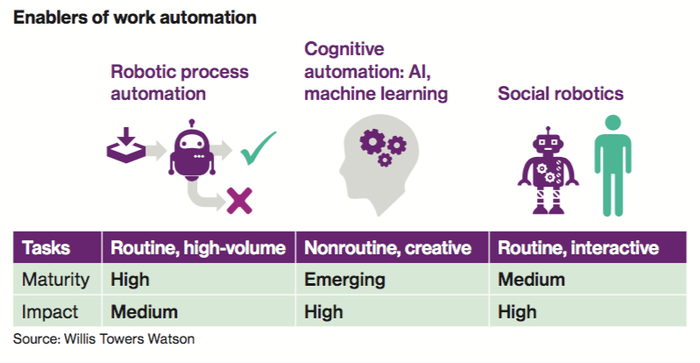Workplace Automation To Double In Next Three Years
March 19, 2018

LONDON, UK - The use of AI technologies in the workplace is expected to double in the next three years, according to a new survey by Willis Towers Watson.
The 2017-2018 Global Future of Work Survey invited participants from over 900 organizations globally to share their thoughts on work in the coming years, with significant implications for businesses and workers alike.
While respondents report that only 12% of work is currently being done achieving AI and robotics versus 7% three years ago, that figure is anticipated to rise to 22% in the next three years.
 "With the surge in workplace automation, employers are moving beyond the myths and stereotypes," the authors explain. "A growing number recognize the need for breakthrough approaches in talent and rewards as well as leadership activities in order to optimally manage the many emerging work options ranging from contingent labour to automation. But few employers are fully prepared to implement the organizational changes required to meet this challenge."
"With the surge in workplace automation, employers are moving beyond the myths and stereotypes," the authors explain. "A growing number recognize the need for breakthrough approaches in talent and rewards as well as leadership activities in order to optimally manage the many emerging work options ranging from contingent labour to automation. But few employers are fully prepared to implement the organizational changes required to meet this challenge."
Adopting a myth-busting approach, the Global Future of Work Survey seeks to dispel misnomers surrounding AI and the workplace. These range from misconceptions regarding the reasons behind organizations' use of the technologies ("Organizations use automation primarily to reduce costs and minimize errors"), all the way up to big-picture issues ("Workplace automation will have a largely negative impact on workers and jobs").
"Moving beyond these myths will help your organization better understand the many emerging options for getting work done, and identify the optimal combinations of human talent and automation," the report argues. "Workplace automation can help employers get work done more efficiently and improve the utilization of talent by enabling human workers to focus on higher-value activities."
Speaking to AI Business last month, Digital Lead for WillisTowerWatson's Future of Work team, George Zarkadakis, explained that the remit for workplace automation goes far beyond IT departments. "The new wave of automation is creating a major disruption in business models, rather than processes, which demands a reinvention of how work gets done. It changes the role of people, and as a consequence, the nature of the organisation," Zarkadakis said. "Strategizing on automation today, and planning for the next three to five years, could lead to a considerable boost in productivity and operational efficiencies. We're talking about 30% across industries, so that's a huge gain."
About the Author(s)
You May Also Like


.jpg?width=700&auto=webp&quality=80&disable=upscale)
.jpg?width=700&auto=webp&quality=80&disable=upscale)
.jpg?width=700&auto=webp&quality=80&disable=upscale)
.jpg?width=300&auto=webp&quality=80&disable=upscale)
.jpg?width=300&auto=webp&quality=80&disable=upscale)
.jpg?width=300&auto=webp&quality=80&disable=upscale)

